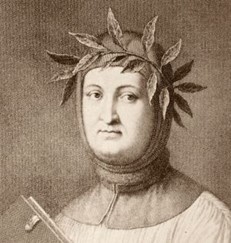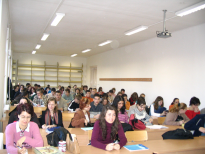Petrarch 650

"Sentioque inexpletum quiddam in precordiis meis semper"
(Secretum)

THE 650th ANNIVERSARY OF THE DEATH OF
FRANCESCO PETRARCH
"LA SFIDA ALLA PAROLA"
INTERNATIONAL SCIENTIFIC CONFERENCE
7-8-9 November 2024
Szeged
Six hundred and fifty years ago, on 19 July 1374, in the town of Arquà, in the Euganean Hills, Francesco Petrarch, then 70 years old, suddenly fell asleep while reading and writing. There is no element of his incredibly rich intellectual legacy that does not provide new reasons or themes for constant commemoration. He is remembered as the father of modern lyricism, the prototype of the cosmopolitan intellectual, a genius at the crossroads of the Middle Ages and the Renaissance, who combined in his work the artistic, intellectual, philosophical and moral responses to the challenges of both periods.
But can the prophet of humanism still have any relevance in an age that has succumbed to the cult of knowledge for its immediate practical utility and the cult of the narcissistic mass society, which sees the word as a mere manipulative tool? European culture seems to have bowed its head to the legacy of Descartes and, in the spirit of critical thinking, first declared war on the humanistic sciences and then, drunk on the exhilaration of victory, soothed its conscience by tolerating as a field of learning those sciences that can be translated into the language of mathematics, rationally accessible and systematised. The four-century-long agony of the studia humanitatis here and there is coming to an end, and it seems to be forced to bow its head before the current epochal transformation of our times. Yet the reality of AI, the language-absorbing mass media and the humanity’s civilising mission to colonise alien planets and galaxies, cry out for man's own unique intellectual 'faculties' and capacities, which cannot be captured by criticism or mathematics, nor can they be replaced by even the most perfect humanoid robot. This epistemological insight can lead us back to a conscious embrace of the importance of the human word, of language and of all the disciplines capable of saving man in an increasingly dehumanised world.
As part of the series of conferences, academic symposia and cultural events organised to mark the 650th anniversary of Petrarch’s birth, we are launching this call to address Petrarch, whose poetry and works in Latin and in the vernacular reveal a man who trusted in the epistemological power of words, whether he was a humanist scholar or a man who relieved Laura, a celebrated poet of the noble courts or a lonely soul struggling with his sins. The intellectual legacy of his life's work should be preserved not for its sheer richness, but for its essential quality of being a mirror of the human soul and spirit. We need Petrarch as much we need a renewed humanism.
The aim of this call is to honour the memory of Francesco Petrarch 650 years after his death: to draw the attention of the academic community to his poetic and philosophical works in Latin and in the vernacular, to their reception in the various national literatures, and to the issues raised by their translation into modern languages. The conference, organised in cooperation with the Italian Department of the University of Szeged, the Italian Cultural Institute of Budapest and the Tiszatáj Foundation, aims to reconstruct Petrarch's intellectual journey by examining the great poet and philosopher's works in a European context, taking into account the different cultural and linguistic contexts in which the reception of his works has unfolded over the centuries.




